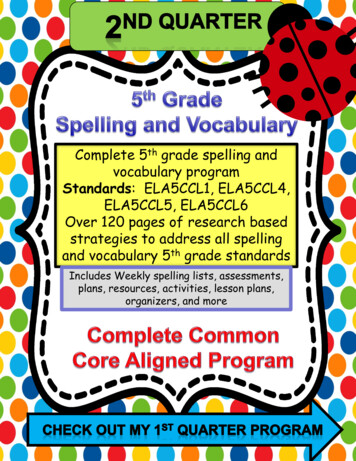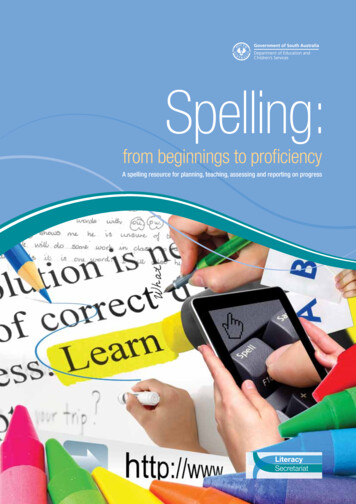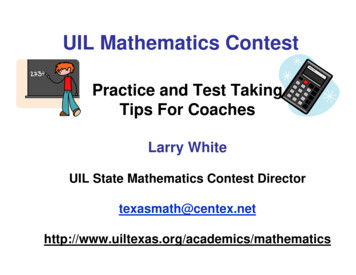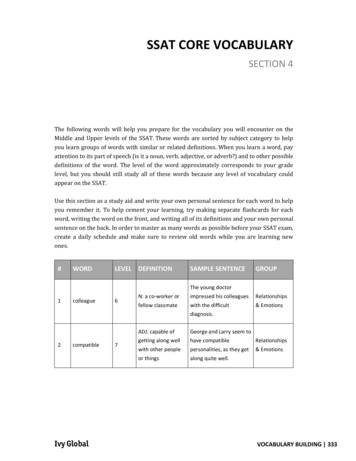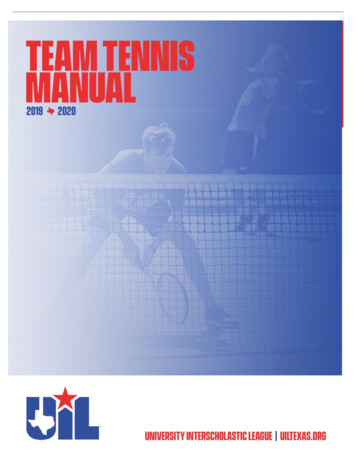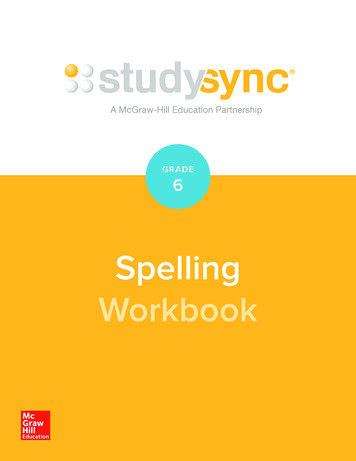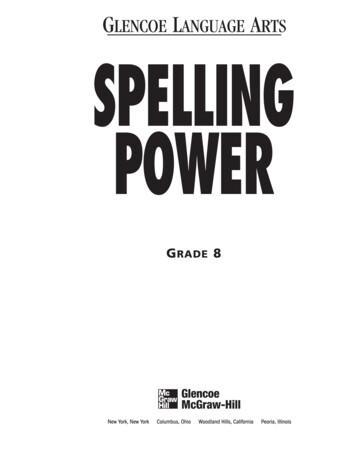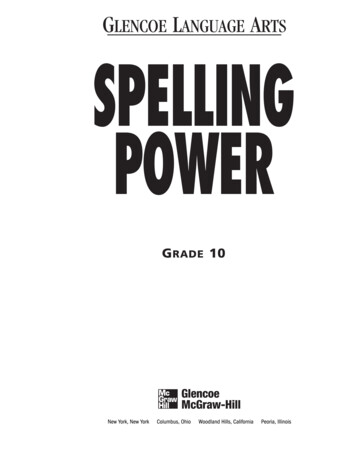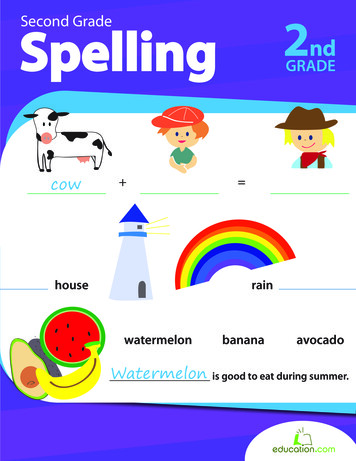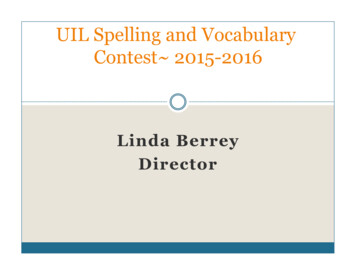
Transcription
UIL Spelling and VocabularyContest 2015-2016Linda BerreyDirector
Man is separated from all other animals by theability to communicate across Space and Time. This ability is made possible by Written Language. Communication in Writing is made possible byMan’s agreement on the symbols he uses.
The Agreed sequence of those writtensymbols is calledSpelling.
The Importance of Correct SpellingWhen our spelling is perfect, it’s invisible. But whenit’s flawed, it prompts strong negative associations.--Marilyn vos SavantTake cares that you never spell a word wrong. Always,before you write a word, consider how it is spelled,and, if you do not remember, turn to a dictionary. Itproduces great praise to a lady to spell well.--Thomas Jefferson in a letter to his daughter Martha
Spelling counts. Spelling is notmerely a tedious exercise in afourth-grade classroom. Spellingis one of the outward and visiblemarks of a disciplined mind.--James J. KilpatrickJournalist and grammarian
Why so much vocabulary? Vocabulary is the best singleindicator of intellectual abilityand an accurate predictor ofsuccess in school.--W.B. Elley, education professoremeritus and literacy researcher
Knowing how to spell words correctly isimportant, but it is equally or perhaps moreimportant to know what words mean and howto use them accurately. As Mark Twain onceremarked, “ The difference between an almostright word and a right word is really a largematter—it’s the difference between thelightning bug and the lightning”.
To put it simply, spelling andvocabulary are important! Correctlyspelled words, coupled with preciseand compelling diction, are two ofthe most important aspects ofeffective communication.
This is theOfficial Wordlist for thisContest.It alsocontains therules andprocedures forthe contest aswell as asample test.The UILConstitution isthe source forall the rules.
UIL Spelling and VocabularyContestPART IA. PROOFREADINGPART IB. VOCABULARYPART II. SPELLING FROMDICTATIONPART III. TIE-BREAKER
Part Ia. Proofreading15 points - requires that contestants given sets offive-word lists recognize the word which ismisspelled in each list and write it spelled correctlyMost of the words from this section of the test arefrom Word PowerUp to twenty percent (20%) of the words on thispart of the test may be from other sources
Part Ib. Vocabulary15 points - multiple choice test of word origins andmeaning.The 350 words designated for this part of the test aremarked in the WordPower list with a DOT.The Vocabulary section has no misspelled words, butcontestants are also responsible for the correctspelling of these words.
Part II. Spelling from Dictation70 points - 70 words, pronounced at a rate of 4words per minute - one every fifteen seconds**change from last year’s 5 words per minute**
Part III. Tie-breaker20-words, pronounced at 4 words per minute With the exception of the State contest, this part isscored ONLY in case of ties and then only thoseinvolved in the tie are scored.
Sources of Words80% of the test words for Part Ia and Parts II and IIIcome from the WordPower list.Up to 20% come from Common Usage, Words from school course materials, such astextbook glossaries, News and Current Events - Words and Proper names Vocabulary Builders - roots and affixes which appearin the list as other parts of speech, and other words of interest.
How to prepare for those dreaded outside words Study roots and affixes. Encourage students to read widely and to PAYATTENTION to words that are new to them. Go to the Internet and find lists of SAT or collegevocabulary. For instance, quizlet.com has a listcalled “College Board Top 100 SAT/ACT VocabularyWords.” Majortests.com also has helpful word lists.A great list of 5,000 (yes, 5,000!) words can be foundat freevocabulary.com
The Official DictionaryThe official dictionary of this contest isThe American Heritage Dictionary ofthe English Language,Third, Fourth, or Fifth edition.This contest is based only on the definitions,pronunciations, and usages in this dictionary.All the contest words are in this dictionary.
In Case of Error in the Word Power List If the Word Power list has an errorin spelling, the correction isannounced in the Official Notices ofthe Leaguer, the UIL’s newspaper,which is now found online at theUIL website.
Using Language SkillstoBuild Strength in SpellingPhonics, Pronunciation,andSpelling
“Sounding out Words”“Pure Vowels”“Diphthongs – Vowel pairs”“Rules for long and short Vowels”“Pure consonants and blends”“Sound Symbol correspondence”“Sound Color”
SUPERCALIFRAGILISTICEXPIALIDOCIOUSSUPER CALI FRAGIL ISTIC EXPI ALI DO CIOUS
Pronunciation Spelling is a very recent language skill. Before there was a written form oflanguage, there were words. The invention of the printing pressmade it necessary to come toagreement on how to present words inwriting.
Sound-Symbol Correspondence In languages like Latin and Spanish, there isa direct correspondence between sound andsymbol: each sound is represented by aspecific symbol. In other languages, including English, aspeech sound may be represented by severalsymbols and a symbol may represent severalsounds, depending on the letters around it.
Problems in PronunciationPRONOUNCEghoti
Problems in Pronunciation“Non-correspondence” exceptions: ghoti is pronounced “fish” How? coughwomennationThis is English!!
Problems in Pronunciation“Schwa” ƏSUPERCALIFRAGILISTICEXPIALIDOCIOUSandSUP ə RCAL ə FRAG ə LISTICEXPIAL ə DOCI əSəəəəə
Watch and Listen for acolyte (ăk əә-līt′)adenoma (ăd əәn-o məә)babushka (bəә-boosh kəә)cacophonous (kəә-käf əә-nəәs)distensible (dĭ-stĭn səә-bəәl)indecipherable (ĭn dĭ-sī fəәr-əә-bəәl)pachydermatous (păk ĭ-dûr məә-təәs)(These words are not from this year’s list)
Problems in PronunciationConsonant BlendsConsonant pairs (bl-,br-, ch, etc.) haveblended sounds that are different from thatof the letters pronounced separately.Diphthongs (Vowel pairs) such as -ae, -ai,-au, -ea, etc.) are the same issue.Separating these pairs into their componentsounds, exaggerating each sound, facilitatesspelling.
One solutionSound Color exaggerated “Pure” letter-soundConsonant/vowel blends can be moretroublesome; they may sound the same butlook different:Precious preshusContentious contenshus¡ precious presheeus¡ contentious contenteeusSpeak the Spelling!
Troublesome Spelling Items Compound words Words with non-alphabetical marks Words with alternate spellings Capitalized words Words with optional capitalization Words where definition determinescapitalization
Examples from this year’s Word Power listTwo-word testitemsNon-alphabeticelements chaise longue deep-six Barbary Coast Reye’s syndrome al dente jalapeño sarus crane cat-o’-nine-tails vox angelica Sjögren’s tai chi, Tai Chisyndrome
Examples from this year’s Word Power ListAlternate Spellings miosis or myosis anapest oranapaest stymieing orstymying gaffe or gaff riata or reata penology orpoenology
CapitalizationCapitalizationRequired Eurasia Klondike Formica (trademark)CapitalizationOptional Fundamentalism,fundamentalism Pantheon,pantheonCapitalizationdepends on thedefinition given forsythia anyshrub of the genus Forsythia thegenus waterloo anycrushing defeat Waterloo town ofcentral Belgium
Root Words, Language History, andSpellingWords can be put together from source words androot words to form words that never existed before:Tele distance-metrics measurement-phony sound-graphy writing-vision viewing
New Needs New words from oldpartsTelevisionTelephoneTelemetryTelegraph
Root Words and Affixes a- : without -graphy: recording, angio- : pain arterio- : artery arthro- : joints cardio-: heart cranio- : skull dys -: unhealthy -ectomy : cutting out eu- : healthy writinghemo- : blood-itis: inflammationlaryngo- :throatlipo- : fatlitho- : stonemeter : measuremyelo- : muscle
Root Words and Affixes neuro- : nerve thoraco- : chest -ology: study thrombo- : clot oto- : ear trauma- : damage or -otomy : cutting intoinjuryAnd there are many morethat you can find as theyare used in theWordPower listGoogle Root Words formuch more on this topic. patho- : illness -pathy : disease peri- : around -pnea : breathing rhino- : nose
Root Words and Affixes Oto- ear -rhino- nose -laryng- throat -ologist One who studiesEar, Nose and Throat doctor Otorhinolaryngologist
Root Words and AffixesAs you study the WordPower list, especiallyfor Vocabulary Words, make lists of the RootWords, prefixes, and suffixes you identify.That way you learn the pieces once andhave them every time you need them, suchas when you take the SAT.
Basic Spelling Rules Words Ending in a Silent eBefore adding a suffix beginning with a vowel or y to aword ending in a silent e, drop the e (with someexceptions).amaze ing amazingnerve ous nervousExceptions: change able changeable; courage ous courageous
Words Ending in a ConsonantIn words of more than one syllable, double the finalconsonant when the word ends with one consonantpreceded by one vowel AND when the word is accentedon the last syllable.be GIN ing beginningper MIT ing permittingre FER ing referringNote that in the new words formed with suffixes, thestress remains on the SAME syllable.
In the following examples the accent does NOT remainon the same syllable; thus, the final consonant is notdoubled.RE fer ence referenceCON fer ence conferencePRE fer ence preference
Prefixes and Suffixes in Spelling When adding a prefix to a word, do not change thespelling of the base word. When a prefix creates adouble letter, keep both letters.ir regular irregularil logical illogicalmis spell misspell When adding –ness to a word ending in n, keep bothn’s.sudden ness suddennessthin ness thinness
i before e? Remember this rule learned in elementary school: ibefore e except after c or sounded long a.i before e: thief, relieve, grieve, niece, fieldexcept after c: conceit, perceive, ceiling, receiptsounded long a: skein, vein, feintExceptions: either, weird, seize, leisure
Organize for LearningAll of these features of words in theWordPower list can be used to organize thewords to help you learn them.Put words with similar features together inWord Families.
Word Families Words with common or similar characteristics Word forms Words with non-alphabetic elements Alternate spellings Capitalization (Required, Optional, for Definition) Root words and Affixes Contexts
Contexts and Word Families Trademarks Medical terms Legal terms Food terms Political terms Musical terms Words from the same language Words with non-alphabetic elements
Non-Alphabetic Written Symbols Words which have come in to English from otherlanguages may have non-alphabetic features whichdesignate pronunciation, such as the tilde the circumflex and caronˇ the cedilla , the dieresis or umlaut and the acute and grave accentsThese are Pronunciation features and must beused correctly in spelling the word correctly.
Ways to Study and Prepare
How to begin? Have fun with your students! If you are bored oruninterested, you can be sure that they will be, too!To be an effective UIL Spelling coach, you MUST beexcited about words. If you are, you will convey yourlove of words to your students. Emphasize the team aspect of UIL and encourageteammates to support each other and to help eachother learn words more about this later! Expect to devote a good deal of time to preparing forthis contest. It takes work to produce winners!
Create Study Materials Word Cards and Practices sets¡ Lookup each word;¡ On a 3 x 5 card: Write the definition; Write the derivation (root or origin) Write the pronunciation given and thepronunciation that reflects the “sound color" ofthe vowels in unaccented syllables.
Establish a ContextWrite sentences with the words that are clues to theirmeaning - that way, you remember the entire idea,the sound of the context sentence, and the clue to themeaning. This can help with vocabulary andproofreading questions.Instead of skipping the words you do not know whenyou come to them, write them down or highlightthem and look them up. (That works for reading foryour classwork, too)
Establish a Context When you have written the word, its definition,derivation, and pronunciation on the card, write asentence that uses the word in its appropriatecontext. Pronounce the word and listen to the way it sounds;repeat it several times if it is a hard word. Say the word. Spell the word. Say the word. Say the word. Write the word. Say the word.
Ways to Study and PrepareWord Cards Practice Sets¡ ¡ ¡ ¡ ¡ Word FamiliesWord ContextsWord StructureWords with CapitalsWords with Non-Alphabetic SymbolsStudy Buddies Practice Rate: 1 word every 15 seconds Study Games – Scrabble, et cetera
Ways to Study and Prepare Source-of-Error Check: “How did I make thatmistake?” Look up new words in your reading Mix-and-Match Roots and Affixes – a NewGame? Audiotape¡ Purchased or Teacher-made Self-made Pronounced list– Cell phone file? To hear words pronounced, trywww.mydictionary.com
Ways to Study and Prepare: UIL ResourcesThe Spelling section of the UIL Website alsocontains a correlation of the Spelling Contest andthe TEA requirements for spelling, as well as samplelessons for improving spelling. URL for UIL Sample Spelling ellingVocab-Sample-Lessons.pdfURL for vendors of practice ces/additional-resources
Word Wars? Lydia: You are such a tatterdemalion! Go rusticate! Kendall: I hope you get the screaming meemies, youvarlet! Lydia: You wisenheimer! You think you’re a whizbang wonk but vox populi says you’re really just aboondoggling Walter Mitty! Kendall: You are gauche and lack erudition! Go falloff a cuesta and catch kyphosis! Lydia: Your floruit is over! I hope you become anold feme covert making feijoada and falafel!
Cautions for Practice Speakers may omit sounds or add sounds in suchwords as different, leverage, surprise,temperament, recognize, history. Speakers may transpose (switch) letters inpronouncing such words as irrelevant, tragedy,hundred, realtor. Make sure you are hearing the word as it is tobe written Use Competition Rate of pronunciation– four words a minute 15 seconds per word
Practice writing legiblyIf graders can’t tell what a letter is, they isolate itfrom the rest of the word by placing their thumbsor cards on either side of it.If it is unrecognizable, it is incorrect. Two of thethree graders must agree that the letter is corrector it is a missed word.Use standard handwriting or print.Make a clear distinction between upper- andlower-case letters – DO NOT USE ALL CAPITALS!
Winners Double-check Results At contests, always use the fifteen minuteVerification Period between the scoring of thepapers and the announcement of Final Results tocheck the computation of your score.
Winners PreparePractice, Practice, PracticeIf you prepare,you will be a winner!
Sources of Words 80% of the test words for Part Ia and Parts II and III come from the WordPower list. Up to 20% come from Common Usage, Words from school course materials, such as textbook glossaries, News and Current Events - Words and Proper names Vocabulary Builders - roots and affixes which appear in the list as other parts of speech,

